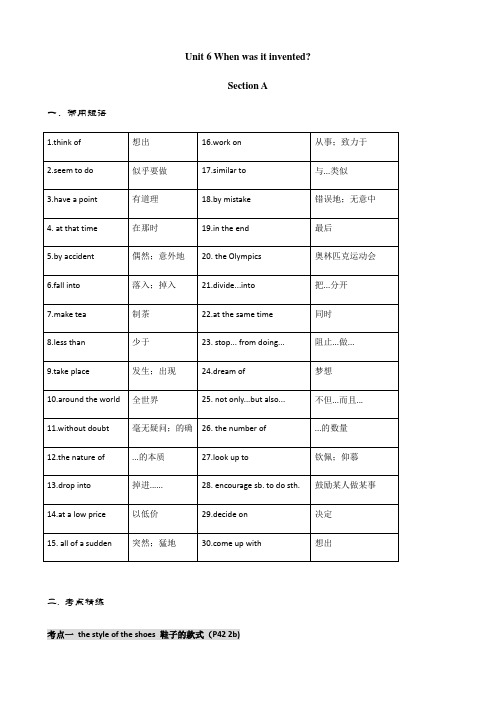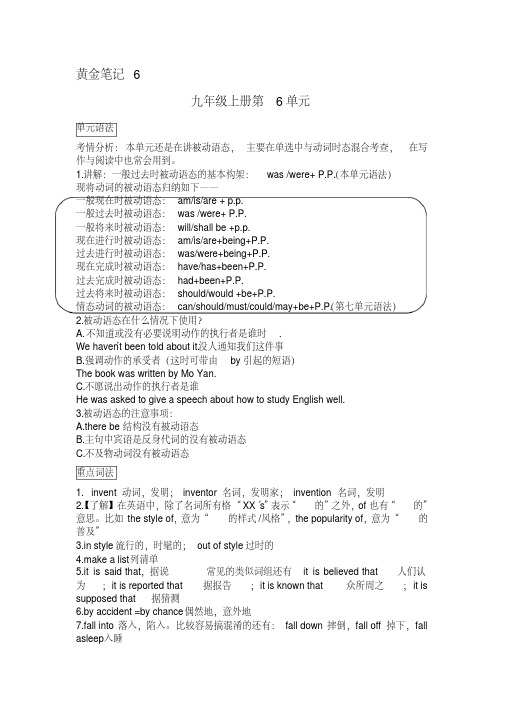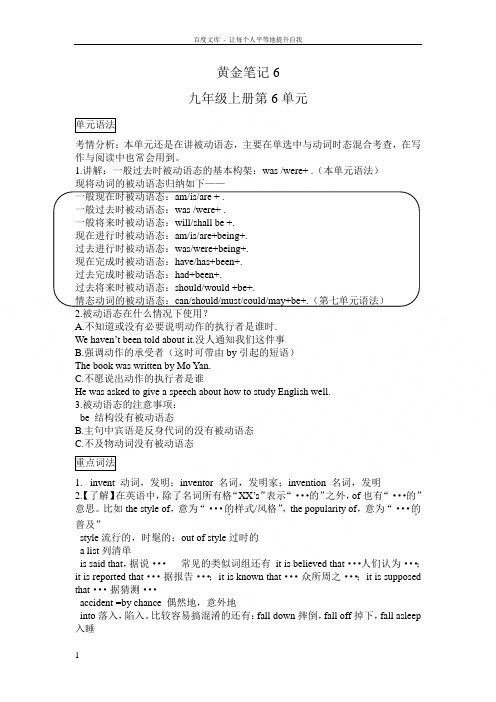最新人教版9年级英语第六单元知识点归纳
人教版九年级英语全一册知识梳理第六单元《Unit 6 Section A》

Unit 6 When was it invented?Section A一.常用短语二.考点精练考点一the style of the shoes 鞋子的款式(P42 2b)(1)style词性_________,意为__________。
常用短语in style意为“时髦的”,其反义短语为_____________,意为“过时的”。
名词/“样式;款式”/out of style☑ This year's style in dresses is different from last year's.今年的裙子样式与去年的不同。
☑ Her clothes are always in style.她的衣服总是很时髦。
(2)style 做名词,还可意为___________。
“方式”☑ Our children need new learning styles.我们的孩子需要新的学习方式。
考点二With pleasure! 非常愿意!(P42 2d)pleasure词性_________,意为___________。
名词/“高兴;愉快”☑ Watching the 2016 Summer Olympics gave him great pleasure.观看2016年夏季奥运会给他以极大的愉悦。
【辨析】with pleasure与my pleasure☑-Could you help me with my English?你能帮我学习英语吗?-With pleasure.当然可以。
☑ Thanks for helping me.谢谢你帮助了我。
-My pleasure./It's a pleasure.别客气。
考点三Think about how often it's used in our daily lives. 想想看,在我们的日常生活中它被使用得多么频繁。
(P42 2d)daily此处词性为_________,意为___________。
人教版9年级英语第六单元知识点归纳

精心整理九年级上册第6单元考情分析:本单元还是在讲被动语态,主要在单选中与动词时态混合考查,在写作与阅读中也常会用到。
A.不知道或没有必要说明动作的执行者是谁时.We haven’t been told about it.没人通知我们这件事B.强调动作的承受者(这时可带由by引起的短语)The book was written by Mo Yan.C.不愿说出动作的执行者是谁He was asked to give a speech about how to study English well.3.被动语态的注意事项:A. there be 结构没有被动语态B.主句中宾语是反身代词的没有被动语态7.fall into落入,陷入。
比较容易搞混淆的还有:fall down摔倒,fall off掉下,fall asleep入睡8.辨析:remain是动词,保持不变/仍然是;remind动词,提醒,remind to do sth,remind···of。
9.辨析:【了解】家;translation名词,翻译15.all of a sudden突然,猛地=suddenly16.by mistake无意中,错误地17.much-loved 深受喜爱的,复合形容词18.divide···into···把····分成·····19.stop···from···阻止····做····20.dream of/about 梦想···向往···· (of/about是介词,后面的动词用-ing 形式)21.look up to 倾佩/仰慕/抬起头看练习:(15年上海中考)以“I want to invent ______"为题,写一篇不少于60个词的短文,标点符号不占格参考词汇:1.It can be used to ...with the help of our robot doctors,?you can talk to your personal doctor one to one whenever you want.In short, family doctor robots can?make great contribution to?our society.精彩亮点分析:亮点一:全文巧用“first, furthermore, in short”等连接词,把家庭机器人医生的好处写的非常清晰,让阅卷老师一目了然。
最新人教版9年级英语第六单元知识点归纳

黄金笔记6九年级上册第6单元单元语法考情分析:本单元还是在讲被动语态,主要在单选中与动词时态混合考查,在写作与阅读中也常会用到。
1.讲解:一般过去时被动语态的基本构架:was /were+ P.P.(本单元语法)现将动词的被动语态归纳如下——一般现在时被动语态:am/is/are + p.p.一般过去时被动语态:was /were+ P.P.一般将来时被动语态:will/shall be +p.p.现在进行时被动语态:am/is/are+being+P.P.过去进行时被动语态:was/were+being+P.P.现在完成时被动语态:have/has+been+P.P.过去完成时被动语态:had+been+P.P.过去将来时被动语态:should/would +be+P.P.情态动词的被动语态:can/should/must/could/may+be+P.P.(第七单元语法)2.被动语态在什么情况下使用?A.不知道或没有必要说明动作的执行者是谁时.We haven’t been told about it.没人通知我们这件事B.强调动作的承受者(这时可带由by引起的短语)The book was written by Mo Yan.C.不愿说出动作的执行者是谁He was asked to give a speech about how to study English well.3.被动语态的注意事项:A.there be 结构没有被动语态B.主句中宾语是反身代词的没有被动语态C.不及物动词没有被动语态重点词法1.invent 动词,发明;inventor 名词,发明家;invention 名词,发明2.【了解】在英语中,除了名词所有格“XX’s”表示“···的”之外,of也有“···的”意思。
比如the style of,意为“···的样式/风格”,the popularity of,意为“···的普及”3.in style流行的,时髦的;out of style过时的4.make a list列清单5.it is said that,据说···常见的类似词组还有it is believed that···人们认为···;it is reported that···据报告···;it is known that···众所周之···;it is supposed that···据猜测···6.by accident =by chance 偶然地,意外地7.fall into落入,陷入。
人教版9年级英语第六单元知识点归纳

黄金笔记6九年级上册第6单元单元语法考情分析:本单元还是在讲被动语态,主要在单选中与动词时态混合考查,在写作与阅读中也常会用到。
1.讲解:一般过去时被动语态的基本构架:was /were+ .(本单元语法)现将动词的被动语态归纳如下——一般现在时被动语态:am/is/are + .一般过去时被动语态:was /were+ .一般将来时被动语态:will/shall be +.现在进行时被动语态:am/is/are+being+.过去进行时被动语态:was/were+being+.现在完成时被动语态:have/has+been+.过去完成时被动语态:had+been+.过去将来时被动语态:should/would +be+.情态动词的被动语态:can/should/must/could/may+be+.(第七单元语法)2.被动语态在什么情况下使用?A.不知道或没有必要说明动作的执行者是谁时.We haven’t been told about it.没人通知我们这件事B.强调动作的承受者(这时可带由by引起的短语)The book was written by Mo Yan.C.不愿说出动作的执行者是谁He was asked to give a speech about how to study English well.3.被动语态的注意事项:be 结构没有被动语态B.主句中宾语是反身代词的没有被动语态C.不及物动词没有被动语态重点词法1.invent 动词,发明;inventor 名词,发明家;invention 名词,发明2.【了解】在英语中,除了名词所有格“XX’s”表示“···的”之外,of也有“···的”意思。
比如the style of,意为“···的.样式/风格”,the popularity of,意为“···的.普及”style流行的,时髦的;out of style过时的a list列清单is said that,据说···常见的类似词组还有it is believed that···人们认为···;it is reported that···据报告···;it is known that···众所周之···;it is supposed that···据猜测···accident =by chance 偶然地,意外地into落入,陷入。
人教版九年级英语第六单元单词解析

第六单元1、prefer更喜爱;更喜欢(preferred---preferring)prefer sth. 更喜欢某事I prefer English. 我更喜欢英语。
prefer doing/ to do 宁愿做某事I prefer sitting/ to sit.我宁愿坐着。
prefer sth to sth. 同…相比更喜欢…(like---better than----) I prefer dogs to cats. 与猫相比我更喜欢狗。
prefer doing to doing 宁愿做某事而不愿做某事I prefer walking to sitting. 我宁愿走路也不愿坐着。
Prefer to do rather than do sth.I prefer to do my homework rather than see such a boring film.2. along with 伴随…同…一道I sing along with m usic. 我伴随着音乐唱歌。
I will go along with you. 我同你一道去。
3、lyric n. (常pl. )歌词;抒情词句The lyrics of that song touched m e.4、gentle adj. 轻柔的;柔和的Please be gentle to the kids.5、dislike [dIs5laIk]v. 不喜欢(like喜欢=enjoy)I dislike eating durian because of the s m ell.6、rem ind sb. of sb./sth. 提醒使…记起….This song rem inds him of his m other. 这首歌使他记起了他的妈妈。
The old lady rem inds m e of my grandmother.7、heart n. 心;内心learn---by heart 背诵She is sufferring from heart disease.– How do you learn English words? -First of all I learn them by heart.8、string n. 细绳;线I don’even know how m any strings a guitar has.9、sink v.(sank\sunk)下沉;沉没The coin sinks in the water.10、Yellow River 黄河Yellow River is one of the famous rivers in China.11、fisherm an 渔夫渔民复数形式fisherm enWhen I was young,I wanted to be a fisherm an.12、latest adj. 最近的late 晚的later比较晚lately近来I have read the lastest news about the aeroplane accident.13、entertain v.娱乐、entertainm ent n.娱乐;乐趣;快乐This bar is a good place for relaxation and entertainm ent.14、feature n. 特点;特征Team work is the m ain feaature of this programme.15、gallery n. 美术馆;画廊16、photograph n. 照片相片photography n. 摄影照相photographer n. 摄影者;摄影师Can I take a look at the photographs taken last week?I am deeply interested inphotography.Gu Changwei is one of the top photographers in China.17、display v.& n, 展览;陈列on display 展览;陈列Please stay away from the art display.His latest art piece will be on display next week.18、interest v. & n. 引起......关注;使......感兴趣interested interestingMy interest is going fishing.19、class n. 等级;类别I want to stay in a higher class hotel during travelling.20、whatever (=no m atter what)pron. 不管什么;无论什么;任何(事物)Whatever you decide to do,I will support you.Wherever you go, whatever you do, I’ll be right here waiting for you.21、m iss v. 错过;遗漏I dont want to miss a single m oment with you.22、suggest v. 显示;间接明白暗示;建议suggest doing sth建议做某事suggestion n.It's getting colder and colder. I suggest buying some warm clothes.W e will consider your suggestion later.23、energy n. 活力力量energetic adj. 有活力的She puts all her energies in her work.24、okay adj.(=OK) 好的She replied okay for m y invitation of going for a date.25、pro n. (常pl.)赞成的观点26、con n. (常pl.)反对的观点There are pros and cons of holding this m eeting.27、honesty n. honest adj.诚实的to be honest(作插入语)老实说;说实在的To be honest,I dont agree with your opinion.如:To be honest I really like flowers. 老实说我真的很喜欢花。
人教版英语9年级上册第6单元sectionB知识点总结

篮球是由出生于1861年的加拿大医生詹姆斯·奈史密斯发明的。。
Canadian
adj. 加拿大的;加拿大人的 n. 加拿大人 Cana1861. 非限制性定语从句。 先行词是人关系词用who
popular
adj. 受欢迎的
7. The number of foreign players, including Chinese players, in the NBA has increased. p46
包括中国球员在内的NBA外籍球员数量有所增加.
including 介词. 包含;包括
include v. including 介 included adj.
A.into B. in C. on D. onto
1. We are going to divide the class__D__small groups.
A.to B. in C. of D .into
2. He lived in place ____D______ Gum Tree.
A.called B. name C. named D. Both A and C
这些明星鼓励年轻人努力工作来实现他们的梦想。
encourage sb. to do sth. 鼓励某人做某事
achieve v. 完成;实现
achieve one's dream 实现梦想
Exercises 1. -__D___boys come to swim. Do you know_____ of them?
这台冰箱以低价出售。
look up to 钦佩;仰慕;抬头看
最新人教版9年级英语第六单元知识点归纳
黄金笔记6九年级上册第6单元考情分析:本单元还是在讲被动语态,主要在单选中与动词时态混合考查,在写作与阅读中也常会用到。
1.讲解:一般过去时被动语态的基本构架:was /were+ P.P.(本单元语法)现将动词的被动语态归纳如下——2.被动语态在什么情况下使用?A.不知道或没有必要说明动作的执行者是谁时.We haven’t been told about it.没人通知我们这件事B.强调动作的承受者(这时可带由by引起的短语)The book was written by Mo Yan.C.不愿说出动作的执行者是谁He was asked to give a speech about how to study English well.3.被动语态的注意事项:A.there be 结构没有被动语态B.主句中宾语是反身代词的没有被动语态C.不及物动词没有被动语态1.invent 动词,发明;inventor 名词,发明家;invention 名词,发明2.【了解】在英语中,除了名词所有格“XX’s”表示“···的”之外,of也有“···的”意思。
比如the style of,意为“···的.样式/风格”,the popularity of,意为“···的.普及”3.in style流行的,时髦的;out of style过时的4.make a list列清单5.it is said that,据说···常见的类似词组还有it is believed that···人们认为···;it is reported that···据报告···;it is known that···众所周之···;it is supposed that···据猜测···6.by accident =by chance 偶然地,意外地7.fall into落入,陷入。
人教版英语九年级全一册第六单元重点短语归纳
the Olympics奥林匹克运动会
divide...into...把……分成……
at the same time同时
stop...from doing...阻止……做……
dream of = dream about梦想;向往
not only...but also...不但……而且……
the number of...……的数量
a number of...大量的……
look up to钦佩;仰慕
achieve one’s dream实现某人的梦想
take notes记笔记
lead to导致
at a low price以低价
translate...into...把……翻译成……
all of a sudden突然;猛地
work on从事;致力于
by mistake错误地;无意中
in the end最后
a cook called George Crum = a cook named George Crum一个名叫乔治·克拉姆的厨师
九年级全一册第六单元重点短语归纳
the style of...……的样式
have a point有道理
by accident = by chance偶然;意外地
make tea泡茶
be used for被用于……
think of = think about想;考虑
fall into落入;陷入
in our daily life在我们的日常生活中
some time一段时间
around the world = all over the world全世界
the nature of……的本质
九年级英语第六单元知识点人教版
九年级英语第六单元知识点人教版九年级英语第六单元知识点在九年级英语学习中,第六单元是我们学习的重要内容。
本文将分别从语法、词汇和阅读理解几个方面介绍这一单元的知识点。
一、语法第六单元主要涉及的语法知识点是现在完成时。
现在完成时表示过去发生的事情与现在的关系,常见的结构是"have/has + 过去分词"。
例如:I have visited Beijing.(我去过北京。
)这个时态在英语中用的非常频繁,因此我们需要掌握好它的用法。
除了肯定句外,现在完成时还有否定句和疑问句的构成。
否定句的构成是在助动词“have/has”后面加上“not”,例如:I have not finished my homework yet.(我还没有做完作业。
)疑问句的构成是将助动词“have/has”放在句子的开头,例如:Have you eaten dinner?(你吃过晚饭了吗?)二、词汇第六单元的词汇主要包括动词短语和名词短语。
例如,动词短语“look forward to”意思是“期待”,在句子中常用于表示期待将要发生的事情,例如:I am looking forward to the summer vacation.(我期待着暑假。
)名词短语“field trip”意思是“实地考察”,也可用作动词短语,表示“实地考察”。
词汇的积累是学习英语的基础,我们可以通过阅读、听力、写作等多种方式来扩大词汇量。
记忆词汇时,可以运用词语联想、造句等方法,提高记忆效果。
同时,多做一些词汇练习题也能够帮助我们记忆和掌握这些单元的词汇。
三、阅读理解在阅读理解方面,第六单元的重点是阅读理解技巧的提升。
我们需要学会如何从文章中获取信息、理解作者的意图以及推断词义。
对于这些技巧的提升,我们可以通过多读英文文章来培养,增加阅读量,从而提高阅读能力。
此外,我们还可以运用一些阅读理解策略来帮助我们更好地理解文章。
比如,可以先快速浏览文章的标题和每个段落的开头句子,从而获取文章的大意;可以使用问题预测法,先读问题,再带着问题去读文章,找到问题的答案等。
人教版9年级英语第六单元知识点归纳
黄金笔记6九年级上册第6单元考情分析:本单元还是在讲被动语态,主要在单选中与动词时态混合考查,在写作与阅读中也常会用到。
1.讲解:一般过去时被动语态的基本构架:was /were+ P.P.(本单元语法)现将动词的被动语态归纳如下——2.被动语态在什么情况下使用?A.不知道或没有必要说明动作的执行者是谁时.We haven’t been told about it.没人通知我们这件事B.强调动作的承受者(这时可带由by引起的短语)The book was written by Mo Yan.C.不愿说出动作的执行者是谁He was asked to give a speech about how to study English well.3.被动语态的注意事项:A.there be 结构没有被动语态B.主句中宾语是反身代词的没有被动语态C.不及物动词没有被动语态1.invent 动词,发明;inventor 名词,发明家;invention 名词,发明2.【了解】在英语中,除了名词所有格“XX’s”表示“···的”之外,of也有“···的”意思。
比如the style of,意为“···的.样式/风格”,the popularity of,意为“···的.普及”3.in style流行的,时髦的;out of style过时的4.make a list列清单5.it is said that,据说···常见的类似词组还有it is believed that···人们认为···;it is reported that···据报告···;it is known that···众所周之···;it is supposed that···据猜测···6.by accident =by chance 偶然地,意外地7.fall into落入,陷入。
- 1、下载文档前请自行甄别文档内容的完整性,平台不提供额外的编辑、内容补充、找答案等附加服务。
- 2、"仅部分预览"的文档,不可在线预览部分如存在完整性等问题,可反馈申请退款(可完整预览的文档不适用该条件!)。
- 3、如文档侵犯您的权益,请联系客服反馈,我们会尽快为您处理(人工客服工作时间:9:00-18:30)。
黄金笔记6
九年级上册第6单元
考情分析:本单元还是在讲被动语态,主要在单选中与动词时态混合考查,在写作与阅读中也常会用到。
1.讲解:一般过去时被动语态的基本构架:was /were+ P.P.(本单元语法)
现将动词的被动语态归纳如下——
2.被动语态在什么情况下使用?
A.不知道或没有必要说明动作的执行者是谁时.
We haven’t been told about it.没人通知我们这件事
B.强调动作的承受者(这时可带由by引起的短语)
The book was written by Mo Yan.
C.不愿说出动作的执行者是谁
He was asked to give a speech about how to study English well.
3.被动语态的注意事项:
A.there be 结构没有被动语态
B.主句中宾语是反身代词的没有被动语态
C.不及物动词没有被动语态
1.invent 动词,发明;inventor 名词,发明家;invention 名词,发明
2.【了解】在英语中,除了名词所有格“XX’s”表示“···的”之外,of也有“···的”意思。
比如the style of,意为“···的样式/风格”,the popularity of,意为“···的普及”
3.in style流行的,时髦的;out of style过时的
4.make a list列清单
5.it is said that,据说···常见的类似词组还有it is believed that···人们认为···;it is reported that···据报告···;it is known that···众所周之···;it is supposed that···据猜测···
6.by accident =by chance 偶然地,意外地
7.fall into落入,陷入。
比较容易搞混淆的还有:fall down摔倒,fall off掉下,fall asleep入睡
8.辨析:remain是动词,保持不变/仍然是;remind动词,提醒,remind to do sth,remind···of。
She comes to visit us sometimes.她有时来看望我们
Lucy has been to Beijing some times.露西已经去过北京几次了
Jack will leave for America sometime next week.杰克将在下周某个时间动身去美国
10.take place发生,出现
11.【了解】英语中如何表达世纪?如the 1870s ,意为19世纪70年代
12.without doubt= there is no doubt that+句子毫无疑问的
13.at····(low/high)price 意为“以(低价/高价)····的价格”
14.translate··into··把···翻译成····translator名词,翻译家;translation名词,翻译
15.all of a sudden突然,猛地=suddenly
16.by mistake无意中,错误地
17.much-loved 深受喜爱的,复合形容词
18.divide···into···把····分成·····
19.stop···from···阻止····做····
20.dream of/about 梦想···向往····(of/about是介词,后面的动词用-ing 形式)
21.look up to 倾佩/仰慕/抬起头看
22.encourage sb to do sth鼓励某人做某事
23.【理解】thousand与基数词(one,two,three等)连用时必须用单数形式且后面不加of → two thousands(×)two thousands of (×) two thousand of (×) 即:thousands of 只表示大概的数字,意为“数以千计的”,这时可以在-s,后面有介词of ,但绝对不能与数词连用。
本单元的中心话题是inventions,主要谈论发明的历史。
写这类作文要围绕下面几个方面:①谁发明的?②什么时候发明的?③用来做什么的?④怎样被发明的?写作时,一般过去时的被动语态一定要熟练且正确使用。
以“I want to invent ______"为题,写一篇不少于60个词的短文,标点符号不占格
参考词汇:1.It can be used to ...
2.It will be exciting/necessary/helpful ...
范文:
I Want To Invent A Family Doctor Robot
I want to invent a family doctor robot, which can be used to cure(治愈) the illness without going out of their home. As far as I’m concerned(在我看来), it will be helpful and useful because of the following reasons:
First, you can see the doctor immediately at home when you feel sick or get hurt. It can save us a lot of time, especially in emergency situations(紧急情况下). Furthermore(而且,此外), hospitals today are always filled with patients, not everyone can be taken good care of. However, with the help of our robot doctors, you can talk to your personal doctor one to one whenever you want.
In short, family doctor robots can make great contribution to our society.
精彩亮点分析:
亮点一:全文巧用“first, furthermore, in short”等连接词,把家庭机器人医生的好处写的非常清晰,让阅卷老师一目了然。
亮点二:全文采用了定语从句、状语从句、并列句等多种长难句,为文采分增色不少。
亮点三:文中出现了“make contribution to”这些单词及词组,恰到好处地强调了家庭机器人医生的重要性,且为文采再次进行润色。
